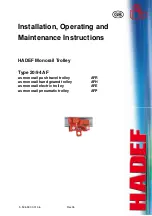
10
The electric trolley or chain hoist trolley combination must be
connected in accordance with supplied wiring diagrams.
Remove approximately 3/8 in. (9 mm) of the electrical power
cable protective casing to expose wires.
Open the spring clamp with a narrow blade (1/8 in. (3.5 mm)
wide) screwdriver, as shown in Dwg. MHP0795 and install
power cable end. Cable (leads) can be identified by color, or in
the case of pendant cables, by numbers taped to each cable.
Terminals are identified by letters or labels on the terminal
blocks. Manufacturer-supplied cables have bare wire ends.
(Dwg. MHP0795)
Ground (Earth) Connections
DANGER
• The ground (earth), green or green/yellow wire, must not
carry any power. With trolley only or trolley/hoist
combinations, the power supply is connected to the control
assembly of the trolley drive motor.
NOTICE
• The ground (earth) connection must be wired to the green/
yellow ground (earth) connection terminal. Ground (earth)
wire of the terminal power supply is connected to the yellow/
green wire (PE).
Brake Assembly (optional feature)
When adding the optional brake assembly to the trolley, the
brake drive must be installed to the motor output shaft. This
procedure requires the removal of the brake arm and discs, then
reinstalling.
Connect brake wiring to terminal block in control assembly.
Refer to schematic Dwg. MHP0823.
The trolley brake assembly locks the main shaft of the trolley
drive motor through a disc brake assembly. This assembly is a
spring set design which locks the rotor shaft when power is not
applied to the motor. When power is applied, the springs are
compressed which allows the motor to rotate and move the load.
WARNING
• If power is disrupted to the trolley with a brake, the load
will not be able to be moved freely.
Trolley Brake Kit Installation
If the trolley brake kit is supplied separately or ordered after the
trolley has been installed follow the steps provided for
installation.
WARNING
• Never perform maintenance on a hoist or trolley while it is
supporting a load.
• Ensure that power is turned off and unit is disconnected.
Refer to Dwg. MHP1075.
1.
Remove capscrews (70 and 71) and lockwashers (16).
Carefully remove brake cover (72). There is a bag of
installation parts inside, remove bag.
2.
Remove retainer (84). Push down on brake lever (82),
while pulling brake pin (83) out of lever block (80).
Carefully release pressure on brake lever (82).
3.
Remove locknut (97, not available separately, part of 85)
on solenoid (85) end of brake lever (82). Remove brake
lever (82), spring (87), spring guide (88) and spring (98,
not available separately, part of 85).
4.
Remove cup disc (74), brake washer (75) and brake discs
(76 and 77).
5.
Remove retainer ring (29) from rotor assembly (31).
Remove four capscrews (26) and lockwashers (34) from
motor cover (27). Using a screwdriver to hold rotor
assembly (31) in position, pull motor cover off. Rotor
assembly (31) should stay in stator (28).
6.
Mount brake housing (90) to stator (28) using three
capscrews (26) and lockwashers (16). The bottom capscrew
(26) and lockwasher (16) is not used due to no access.
7.
Place key (93) in rotor assembly (31) and slide brake hub
(92) on to rotor shaft (31). Install retainer ring (29).
8.
Insert brake discs (starting with 77 then 76, repeat until all
discs are inserted), brake washer (75) and cup disc (74).
9.
Place spring (98, not available separately, part of 85) on
screw section of solenoid (85). Place spring (87) and spring
guide (88) into slot in brake housing (90).
10. Place brake lever (82) into lever block (80) and press down.
While pressing brake lever (82), slide pin (83) through
lever block (80) and brake lever (82) until pin protrudes on
opposite side. Press on retainer (84). Thread locknut (97,
not available separately, part of 85) onto threaded shaft of
solenoid (85) until 2 to 3 threads are exposed beyond
locknut (97).
































